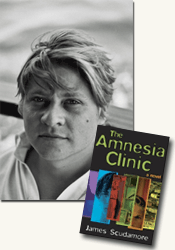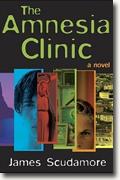author interview
book reviews:
· general fiction
· chick lit/romance
· sci-fi/fantasy
· graphic novels
· nonfiction
· audio books
· author interviews
· children's books @
curledupkids.com
· DVD reviews @
curledupdvd.com
newsletter
win books
buy online
links
home
for authors
& publishiss
for reviewers

|
|||||
 
Author James Scudamore shares his thoughts on good lies, make-believe, and "story junkies" with curledup.com's Michael Leonard Interviewer Michael Leonard: The Amnesia Clinic has many of the attributes of an old-fashioned boyhood adventure tale. What gave you the idea for the story? James Scudamore: The questions I asked myself when starting to write it were: ‘Is it ever possible to tell a good lie – one designed to make someone feel better? How much can you feed someone’s fantasy before reality intrudes? And what are the consequences when it does?’ I also wanted to write something picaresque and episodic, filled with strange and wonderful stories, in which the different tales told from one character to another contributed to a larger ongoing narrative. That was how I came up with the idea of two adolescent boys who are ‘story junkies’, and can’t help but embroider on their experience. And why did you choose Ecuador for your setting? It seemed a good place to set an adventure story. It’s comparatively poorly known (certainly in the UK), and the Amazon rainforest, the Andes and the Pacific Ocean are all quite easily accessed from Quito – which meant that there was scope for my characters to get into plenty of trouble very quickly. I also had the benefit of knowing the country reasonably well from having lived and worked there. It's established pretty early on that Fabián and Anti come from two very different backgrounds. What do you think lies at the core of their relationship? Is it perhaps a case of opposites attract? Or are they in fact quite similar? They’re different in many ways – Anti inhabits a sealed off, expatriate world that real life rarely penetrates, and he’s drawn to what he perceives to be the comparative glamour of Fabián, with his missing parents and his eccentric uncle. But in fact Fabián is closed off from the real world as well, and their love of exaggerated versions of the truth is mutual. The journey they go on, and the consequences of that journey, couldn’t happen without each one of them being there to egg the other one on. Why do you think Anti doesn't tell Fabián the truth behind the Amnesia Clinic from the outset? Is it because he wants to have an adventure? Or is he too frightened of the repercussions of losing the friendship? He invents The Amnesia Clinic in an effort to console his friend for the loss of his mother. But he also invents it because he wants to go away on an adventure. It’s simultaneously a generous and a selfish act.
I enjoyed describing the boys’ journey across Ecuador very much. I was keen to communicate as much as possible the excitement of running away into unknown territory, without straying too far into travelogue. So the principal difficulty came from working out how to put in enough local colour to make the journey atmospheric but not so much that it detracted from the plot. When marine biologist Sally Lightfoot enters the picture, she sort of upstages Fabián, and he gets mad and obstreperous. How much do you think her arrival and her fondness for Anthony contributes to Fabian's increasingly erratic behavior? She’s described in the novel as a ‘horrid catalyst’, and to an extent that’s what her function is – she makes everything worse. But having said that, and without giving too much away about the ending, all is not what it seems when it comes to her character. The novel opens with the discovery of the body of a 500-year old Inca princess who, before her sacrifice to the gods, was made to consume hallucinogenic drugs and strong drink. These are both practices that Fabián later adopts to his detriment. Were these parallels deliberate and what were you trying to show? I certainly thought it was interesting that those Inca sacrifices tended to happen when the victim was at about the same age as my two protagonists (fifteen): it’s an age when a lot changes in life, and not just because it’s at around that time that drugs and booze really start to appeal. But no: I wasn’t trying to ‘show’ anything in particular. Memory, make-believe and even faith are important themes, which re-occur throughout the novel. How are these themes important to all of the protagonists? As I said, they’re story junkies. The boys have an inbuilt love of fantasy and make-believe that is incubated by Suarez (who is irresponsible in the way he embroiders on everything he possibly can). But that love of fantasy is also nurtured by their age, by the fact that they are in South America, by each other.
He finds himself in what is the ultimate nightmare scenario for a pathological liar: he must explain himself simultaneously to two groups of people to whom individually he would offer completely different stories. It’s the ultimate test of his bullshitting prowess, and is where he comes unstuck when reality finally intrudes. I wanted that scene to read like the final showdown between real life and Anti’s capacity to make things up - like a duel, almost. The Amnesia Clinic reads like a labor of love, how hard was it to write your first novel? And do you have any advice for writers who are just starting out? I feel like I’m still starting out myself so it feels more than a little presumptuous to offer advice at this stage. But I’d say that (as with any other occupation) if you want to write more than anything else in the world, then you’ll feel compelled to do it, and keep on doing it, whatever the cost, and however much success you are lucky to find. Are you currently writing a second novel and if so, would you like to tell us a bit about it? Is it set in another exotic location? I am writing another one, and I’ll hopefully be finishing a first draft of it before too long, but I don’t want to say much about it at the moment. It isn’t set in the UK though. And finally, The Amnesia Clinic is ultimately about the tragic ramifications of story telling and not being truthful, but what other life lessons and messages would you like readers to take away from this book? On balance I think I prefer to think of novels as inquiries rather than books of life lessons. So while I’d agree with you that the novel is about storytelling and about not being truthful, I wouldn’t necessarily say that the ramifications are ‘tragic’. And I would be mortified if any reader ever thought I was trying to teach them a lesson… JAMES SCUDAMORE spent a peripatetic childhood in Japan, Brazil, Ecuador, and the United Kingdom, after which he graduated from Oxford University with a first-class degree in modern languages and completed an MA in creative writing at the University of East Anglia. The Amnesia Clinic is his first novel. He lives in London. Contributing reviewer Michael Leonard interviewed James Scudamore, author of The Amnesia Clinic (see accompanying review), about his book via email for curledup.com. Michael Leonard/2007.
|
|||||
| fiction · sf/f · comic books · nonfiction · audio newsletter · free book contest · buy books online review index · links · · authors & publishiss reviewers |
|
| site by ELBO Computing Resources, Inc. | |

